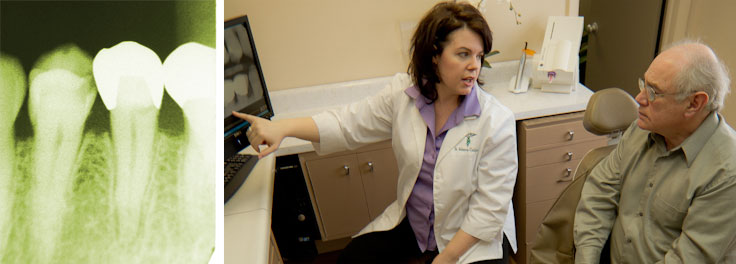Reduce Your Cavity Risk and Environmental Waste
By Katie Dastoli, RDH
It’s no secret we live in a throw-away society.
I can’t count the number of times I’ve walked through a parking lot and seen a handle flosser littered on the ground. You know what I’m talking about — the little plastic handle with about a centimeter of floss on the end. Eventually, that plastic flosser is swept up and begins its journey through the local waste removal system. Did you ever wonder where it ends up? Will it spend countless years at a landfill? Will it end up as a pollutant in our oceans?
I have to admit, I hadn’t really thought much about it until recently, when I handed a plastic toothbrush and some floss to a patient. The patient politely declined after expressing concern about the amount of plastic waste that is generated by our society everyday. This was not the first time I’d met a patient, who expressed such a concern in my dental operatory, but in this instance, I knew I needed to have more consideration, and I was moved to do some research.
As a dental hygienist, a critical part of my job is to provide patient-centered education. It’s important that I offer recommendations that help patients achieve optimal oral health while keeping their values in mind. While I admire those who work diligently to reduce the amount of waste they produce in their everyday lives, it never occurred to me how this could affect their ability to keep up their dental health. The next trip I took through the dental aisle at the store, I realized I was bombarded with a multitude of dental products — many of which are not made from recyclable or biodegradable materials.
Not surprisingly, the United States is currently the most wasteful country in the world, according to an article published in 2019, in the Earth Island Journal. In the article, author Jeff Turrentine cites a report completed by Verisk Maplecroft, a global risk-assessment and consulting firm that states that the “U.S. creates three times the global average of waste.” Even though the U.S. makes up only 4 percent of the world’s population, it generates 12 percent of the planet’s garbage.
Daily!?
Those facts are hard to sink your teeth into.
Fortunately, I have learned that I can still encourage my environmentally conscious patients to establish a healthy oral care routine at home. There are recyclable and biodegradable dental products available, albeit not readily, but they do exist. Most of the products that I was able to find are available for purchase online.
- Dental Lace’s refillable silk dental floss;
- Eco-Dent Gentle Floss (eco-dent admits that the floss is actually made from nylon, which is not biodegradable, but the packaging that the floss comes in is recyclable/biodegradable)
- Public Goods dental floss
Another option for “zero waste floss” is provided by Eco Roots, an online store which claims that both its floss and the packaging it comes in are “either recyclable or compostable.” Eco Roots even offers instructions on disposal: “Put used floss and the small kraft box in compost/recycle pile, or just bury in the soil for mother earth to take care of it.”
Although I was somewhat satisfied to find products that could help my patients clean interdentally, I needed to find a toothbrush that is not made of plastic. Turns out, this was easier than I thought. I just had to do a little more searching, and I soon came across plastic-free toothbrushes made from bamboo. According to brushwithbamboo.com, bamboo has been used to make toothbrushes since the 8th century A.D. The site states, “A bamboo toothbrush has a much lower carbon footprint and a much better end-of-life disposal process than a plastic toothbrush.” Unfortunately, these brushes are not yet approved by the ADA (American Dental Association).
Alternative bamboo brushes include those that are “ethically and sustainably harvested” through woobamboo.com. Finally, wellbeingisland.com, an Australian-based company, offers plastic-free bio toothbrushes, “Friendly Floss” and even handle flossers made of “compostable cornstarch handles and packaging.”
Aside from the traditional wooden toothpick, which is compostable and biodegradable, our dental aisles are slacking when it comes to providing more eco-friendly products. Perhaps, it all comes down to cost and affordability. Purchasing a more environmentally friendly dental product sounds like the better choice, however, it comes with a heftier price tag. But let’s face it, much of our consumerism is affecting our ecosystem in a negative way. Maybe it’s time that we recognize how the long-term benefits of purchasing environmentally friendly products will outweigh those costs in the long run, especially if it means a healthier future – for our mouths and our planet.
Katie Dastoli is a registered dental hygienist at Cochrane Dental Associates in Northampton, Mass.


